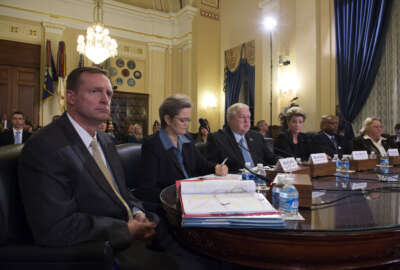
Hubbard Radio Washington DC, LLC. All rights reserved. This website is not intended for users located within the European Economic Area.
Hubbard Radio Washington DC, LLC. All rights reserved. This website is not intended for users located within the European Economic Area.
More than half of current and former senior executives at the Veterans Affairs Department oppose the VA's proposal to reclassify some SES members under Title 38...
Amid growing concerns about the Veterans Affairs Department’s proposal to change how it pays and disciplines its Senior Executive Service members, the VA is having some doubts about its original plan.
VA Secretary Bob McDonald’s proposal would reclassify roughly 300-to-400 SES members at the Veterans Health Administration, Veterans Benefits Administration and National Cemetery Administration under Title 38.
“In working with the executive branch, we’ve come to the point of view that that is appropriate for medical people in the Veterans Health Administration, but there is some pause whether or not we should apply that to people in the Benefits Administration,” McDonald said during a March 10 budget hearing with the Senate Appropriations Subcommittee on Military Construction, Veterans Affairs and Related Agencies.
At the same time, the House is considering alternative legislation that would change pay and recruitment procedures for directors at VA medical centers and Veterans Integrated Service Networks.
The bill, which Federal News Radio obtained, is designed to “improve the authority of the Secretary of Veterans Affairs to hire and retain physicians and other employees of the Department of Veterans Affairs, and for other purposes,” the draft legislation said.
It gives the VA secretary the authority to set pay and performance appraisals for medical directors. It also includes several provisions that are designed to help the VA attract and hire more doctors and nurses, as well as other requirements to study departmental succession planning and create an executive fellowship program.
This comes as more than half of senior executives said they opposed VA’s proposal to reclassify some SESers under Title 38.
The Senior Executives Association received responses from 236 current and former VA senior officials. According to SEA’s preliminary findings, 64 percent said they did not support the move to Title 38, even if they had the opportunity to potentially earn a higher salary.
Roughly 69 percent said they didn’t believe the VA’s proposal would help the department better deliver services to veterans.
In reaction to the VA’s proposal, some VA SES members told SEA they felt “demoraliz[ed] and betrayed.” One said “morale [is the] lowest I’ve seen in 33 years at the VA.”
McDonald said his interest in reclassifying some SESers under Title 38 predates a series of recent Merit Systems Protection Board decisions to overturn punishments for three VA executives. McDonald wrote to VA senior executives Feb. 18, a week after his proposal came up at a House Veterans Affairs Committee hearing on the department’s budget.
“The idea of moving our Senior Executive Service staff to Title 38 was to help us recruit, because we’d have direct hiring authority, was to help us pay more competitively,” McDonald said March 10. “Most of our medical center directors make less than 50 percent of what they can get in the private sector because they are SES employees.”
The VA is struggling to fill SES positions with nearly 30 percent of executive jobs unfilled as of Jan. 28, 2016, the VA draft said. Nearly 22 percent of VHA medical center directors and about 23 percent of agency network directors retired or resigned last fiscal year. And about 70 percent of the department’s current career executives are or will be eligible to retire.
The VA had to re-announce 37 executive positions in fiscal 2015 because it didn’t receive any qualified candidates during the first round of recruitment, the proposal said.
But Jason Briefel, interim president of the Senior Executives Association, said the fact that department leadership waited a week before addressing senior executives about the proposal shows the VA isn’t interested in SES feedback. And despite the department’s claims, the proposal isn’t truly about improving VA SES compensation.
“This is only and all about accountability,” Briefel said.
SESers seem to agree with SEA as 59 percent of those surveyed said they did not believe the VA’s proposal would help the department recruit and retain qualified senior executives.
Yet the VA said salaries that are more competitive with the private sector would help it recruit more senior executives, doctors and medical professionals. The department’s proposal adds another pay band to the three that exist already for VA SES under Title 5.
“This change would motivate highly experienced, seasoned executives to take on leadership roles in VA[‘s] most demanding positions, driving VA’s transformation for the benefit of veterans,” the draft said.
Yet some current and former VA executives don’t see it in the same light.
“Executives are leaving VA not because we don’t earn enough money but because of the environment of fear that has been created,” one respondent told SEA.
The proposal also suggests eliminating the Qualifications Review Board (QRB) process, meaning candidates would no longer need to appear before a board at the Office of Personnel Management, which typically certifies whether the employee has met the right requirements to become a senior executive.
The VA proposal suggested this OPM certification was one of many reasons why the department couldn’t bring on qualified candidates more quickly.
“Cumbersome administrative requirements — including but not limited to the requirement for OPM certification of new senior executives — result in extraordinarily long lag times for VA executive recruitments,” the draft said.
But, again, SEA doesn’t agree. Briefel said the QRB process typically takes about two or three weeks.
Moreover, a former government executive with knowledge of the VA said going through the QRB process itself adds some merit and esteem to the Senior Executive Service. Giving the VA secretary the authority to choose who enters the SES and who doesn’t diminishes the title’s prominence.
“You feel like you’ve earned this senior position, which is a very prestigious position,” said the former executive, who requested anonymity. “That’s not the same thing when you move over to Title 38. That’s a very different set of criteria used for the selection and admission of people under 38.”
SEA fears that the VA’s push to reclassify some SES members could open up the door to similar measures for other departments.
“[It] sets a dangerous precedent for the rest of the government,” Briefel said.
The Health and Human Services and Defense departments both hire doctors and other medical professionals similar to the senior executives the VA is trying to reclassify under Title 38.
“VA is not so unique that it can justify a totally unique system of personnel rules,” the former government executive said. “It’s not. The only thing that can help explain this is that it’s all about politics.”
The timing of this proposal —less than a year before the upcoming presidential transition — isn’t ideal either, the former government executive said.
“You really do need your executives to keep those trains running, keep those services running, to show up to work fully dedicated and focused on their jobs,” the source said. “Transitions to new administrations are always going to be an area of concern and instability, so why are you introducing this now? Because there were only a couple of cases that MSPB didn’t rule in your favor, you’re going to say gee, let’s change the world as we know it?”
Briefel said he sees the House draft legislation as a sign that conversations are stirring around a “more positive, targeted approach” to the VA SES, and he’s pleased to hear the VA Secretary is reconsidering certain aspects of the original proposal.
Subcommittees within the House Veterans Affairs Committee are expected to take up the bill at a legislative hearing March 16.
The Senate Veterans Affairs Committee will consider the VA’s Title 38 proposal at a legislative hearing March 15, where Secretary McDonald is expected to testify, a VA spokesman told Federal News Radio.
Copyright © 2024 Federal News Network. All rights reserved. This website is not intended for users located within the European Economic Area.
Nicole Ogrysko is a reporter for Federal News Network focusing on the federal workforce and federal pay and benefits.
Follow @nogryskoWFED

